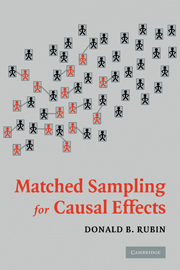Book contents
- Frontmatter
- Contents
- Contributor Acknowledgments
- Matched Sampling for Causal Effects
- My Introduction to Matched Sampling
- PART I THE EARLY YEARS AND THE INFLUENCE OF WILLIAM G. COCHRAN
- PART II UNIVARIATE MATCHING METHODS AND THE DANGERS OF REGRESSION ADJUSTMENT
- PART III BASIC THEORY OF MULTIVARIATE MATCHING
- PART IV FUNDAMENTALS OF PROPENSITY SCORE MATCHING
- PART V AFFINELY INVARIANT MATCHING METHODS WITH ELLIPSOIDALLY SYMMETRIC DISTRIBUTIONS, THEORY AND METHODOLOGY
- PART VI SOME APPLIED CONTRIBUTIONS
- PART VII SOME FOCUSED APPLICATIONS
- Conclusion: Advice to the Investigator
- References
- Author Index
- Subject Index
PART V - AFFINELY INVARIANT MATCHING METHODS WITH ELLIPSOIDALLY SYMMETRIC DISTRIBUTIONS, THEORY AND METHODOLOGY
Published online by Cambridge University Press: 05 June 2012
- Frontmatter
- Contents
- Contributor Acknowledgments
- Matched Sampling for Causal Effects
- My Introduction to Matched Sampling
- PART I THE EARLY YEARS AND THE INFLUENCE OF WILLIAM G. COCHRAN
- PART II UNIVARIATE MATCHING METHODS AND THE DANGERS OF REGRESSION ADJUSTMENT
- PART III BASIC THEORY OF MULTIVARIATE MATCHING
- PART IV FUNDAMENTALS OF PROPENSITY SCORE MATCHING
- PART V AFFINELY INVARIANT MATCHING METHODS WITH ELLIPSOIDALLY SYMMETRIC DISTRIBUTIONS, THEORY AND METHODOLOGY
- PART VI SOME APPLIED CONTRIBUTIONS
- PART VII SOME FOCUSED APPLICATIONS
- Conclusion: Advice to the Investigator
- References
- Author Index
- Subject Index
Summary
Before moving to Harvard University in the summer of 1983, I spent two wonderful years as a Professor at the University of Chicago, 75% in the Department of Statistics and 25% in the Department of Education. During that brief period of time, I supervised several great PhD students, one of whom was Neal Thomas, who, despite a strong mathematics background, had a deep appreciation for applied statistics. The issue of the subasymptotic properties of propensity score matching was of real interest to me at the time, and remains an important one today. His PhD thesis addressed this topic, but he and I made more progress after he was out and working at RAND, and then ETS. The result was a sequence of four articles, which started with quite general theoretical results and then moved to apply that theory.
The first of these, Chapter 15, Rubin and Thomas (1992a), was published in the Annals of Statistics and was built on a substantial extension of EPBR matching methods studied in Chapter 6, Rubin (1976b). Affinely invariant matching methods are ones that are closed under any wide-sense linear transformation of the data, such as discriminant matching (using either the estimated or the population discriminant), propensity score matching (again, using either the population or estimated, e.g., by logistic regression), as well as Mahalanobis-metric matching, and many other methods.
- Type
- Chapter
- Information
- Matched Sampling for Causal Effects , pp. 233 - 234Publisher: Cambridge University PressPrint publication year: 2006



